|
Terence McKenna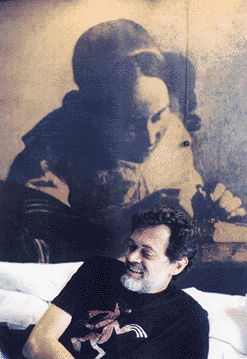 Terence McKenna was the Magellan of psychedelic head space, and humanity's first ambassador to the hyperdimensional machine elves of the Eschaton.
Terence McKenna was the Magellan of psychedelic head space, and humanity's first ambassador to the hyperdimensional machine elves of the Eschaton. McKenna was a true child of the '60s, graduating from UC Berkeley with one of those majors you could only get in Berkeley in the '60s Ecology, Resource Conservation and Shamanism. When he got out of school, he set off for the Amazon, where he "studied" the native hallucinogenic drugs used in various South American shamanic traditions. McKenna studied these drugs repeatedly and in large doses, along with his brother, Dennis. While pursuing these scientific studies, McKenna experienced some interesting effects on his consciousness, not surprisingly. These experiences would form the basis for a series of theories that are extremely cool, if occasionally somewhat sketchy from a rigorous scientific viewpoint. His work has influenced a generation of writers and philosophers, and his writings have been as influential as that of better-known contemporaries like Timothy Leary and Abbie Hoffman. Like them, McKenna advocated the use of drugs, and particularly organic hallucinogens. McKenna also provided his disciples with detailed instructions on the collection, cultivation and application of those drugs. His classic underground work "The Magic Mushroom Growers Guide" can now (ironically enough) be bought on Amazon.com. McKenna had a brilliant mind that moved so fast it was hard to tell whether he was reaching escape velocity or just running in circles. He had a gift for making even outrageous ideas sound credible, and when he applied himself, he could produce works of breathtaking scope and scholarship. His experiences with ayahuasca formed the basis for the beliefs that would shape the rest of his life. Like many users of hallucinogens, McKenna believed that his experiences were real and spiritually significant. Unlike many users of hallucinogens, McKenna spent his life aggressively evangelizing his viewpoint to anyone who would listen (and even a few who wouldn't).
"This is a tremendous challenge to the intellectual structures that have carried us so far during the last thousand years. We can do tricks with atoms, there's no question about that, but these tricks immolate us. The higher-order structure of molecules, let alone organelles and that kind of thing, is intellectual incognita to us. We have no notion of how these things work or what is going on. Yet it is from those levels that the constituent modalities of reality are being laid down." McKenna believed that tryptamine-based organic hallucinogens, such as those found in ayahuasca and magic mushrooms (psilocybin), were a vehicle for communication with other forms of life in the universe, either in what he called "hyperspace" or even literally on other planets. McKenna was particularly fascinated by a certain consistency of experience among hallucinogen users at "heroic" dosages. It seemed as if they were all going to the same place, a realm inhabited by entities he referred to as "self-transforming machine elves." The way these entities were perceived was based on the vehicle for dosing and the cultural context. For instance, McKenna found that DMT (the active ingredient of ayahuasca) could be extracted from plants, purified and smoked, which invariably resulted in the user having a UFO abduction-type experience (in which the machine elves were seen as aliens in flying saucers). McKenna, and those influenced by him, began to speculate about the universality of the hallucinogenic experience, especially as it related to UFOs, angels, faeries and elves. Later, mainstream researchers would pick up on some elements of this (particularly the citation of DMT, which occurs naturally in the brain, as a possible explanation for UFO sightings). McKenna was a prolific writer and left volumes of speeches and books promoting his views. McKenna and his brother were most notoriously the authors of the underground classic, "The Magic Mushroom Growers Guide," which described in great detail how to cultivate psilocybin mushrooms at home (a venture that was very popular since the U.S. government, which had outlawed the mushrooms themselves, had neglected to outlaw the spores, or seeds, used to grow them). The book was published under the psuedonyms "O.T. Oss and O. N. Eric." "Food of the Gods" is perhaps his most credible and coherent work. The book is an extraordinarily complete survey of drug use in human cultures. It extends from prehistory to the modern day, and is replete with scathing indictments of the "war on drugs," particularly as it related to organic plant hallucinogens. McKenna found the notion of outlawing a plant absurd, and he viciously indicted the societal power structure that made possession of hallucinogens a capital crime while peddling refined sugar to children and subsidizing tobacco and alcohol production.
McKenna was continually frustrated by the bans on hallucinogens, which he saw as devastating hypocrisy in a society that legalized big-money mind-numbing drugs such as alchohol. "If the words 'life, liberty, and the pursuit of happiness' don't include the right to experiment with your own consciousness, then the Declaration of Independence isn't worth the hemp it was written on." McKenna argued that plant hallucinogens were inimical to modern cultures because they undermine authority structures by democratically giving all users equal access to the big picture: "Because modern institutions depend on the transmission of a certain world view and then willing acquiescense in the truth of that world view by the populations into which it is being exported. In other words a kind of cultural brainwashing is necessary for modern cultures to work at all. The consequences of the acceptance of this situation of brainwashing is further acceleration toward catastrophe." In "Food of the Gods," McKenna also advanced a startling theory about the evolution of human consciousness, proposing that the evolutionary track leading to the development of modern humans was sparked by the consumption of psilocybin mushrooms by cavemen. Noting that a threshhold dose of psilocybin produces ehanced visual acuity, McKenna theorized that primates who lived in areas where the mushrooms thrived gained an evolutionary advantage in hunting. At these and higher doses, the mushrooms also stimulated the verbal centers of the brain, causing the primates to vocalize aggressively. At first, these vocalizations were random, glossolalia, but with consistent use over time the primates began to associate the sounds with communicative concepts, enhancing the evolutionary advantage provided by the visual acuity. Eventually, language became a learned behavior, and the evolution of consciousness is widely believed to have been an outgrowth of the development of language.
"Food of the Gods" was an intellectual tour de force that made a number of powerful and intellectually persuasive points. But the work that McKenna lived for, and that he considered his most important contributions to society, went a lot further into the fringes of sanity. As noted previously, McKenna believed that organic hallucinogens provided a window into an experience that was both spiritually significant and literally real. So when the hyperdimensional machine elves talked, he listened. And listened. And listened. The result of all this listening was an elaborate theory called Timewave Zero. McKenna argued that time was a fractal wave of "novelty" (the introduction of new ideas and change-producing events), which is in the process of collapsing to a zero point. McKenna extracted a formula for calculating this wave from the 64 hexes of the I-Ching, the ancient Chinese divination tool which is structured around time-related issues. The Time Wave was a graph that, in theory, corresponded to the introduction of new ideas and dramatic change throughout history. When the graph dipped, more novelty entered the world. McKenna lined up his graph against human history, and somehow determined that the Zero Point, the Eschaton, was scheduled for Dec. 21, 2012, which also coincidentally happened to be the end of the 10,000 year calendar used by the Mayans. McKenna planned on being there for the final act, but a brain tumor struck him down more than a decade too soon.
In the end, Terence McKenna became an aggressive evangelist for the Time Wave, which many people found interesting but which lacked the intellectual weight of the theories propounded in "Food of the Gods." McKenna became increasingly associated with flaky New Agers and UFO cult-style views, which never bothered him in the least. He lectured on these topics regularly until his death in 2000. He was a vocal critic of modern society, and often delivered scathing rebukes against the numbing effects of television and the repression of individual spirtual expression. He also saw a lethargy settling over the minds of the masses, encouraged by the powers that be: "We are so much the victims of abstraction that with the Earth in flames we can barely rouse ourselves to wander across the room and look at the thermostat." When he was diagnosed with the tumor in 1999, McKenna sought both conventional and non-conventional treatments, but nothing worked. He died on April 3, 2000.
|
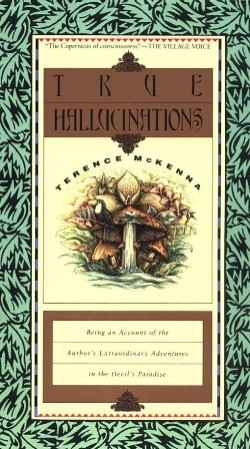 In his own words: "In the Amazon and other places where visionary plants are understood and used, you are conveyed into worlds that are appallingly different from ordinary reality. Their vividness cannot be stressed enough. They are more real than real, and that's something that you sense intuitively. They establish an ontological priority. They are more real than real, and once you get that under your belt and let it rattle around in your mind, then the compass of your life begins to spin and you realize that you are not looking in on the Other; the Other is looking in on you.
In his own words: "In the Amazon and other places where visionary plants are understood and used, you are conveyed into worlds that are appallingly different from ordinary reality. Their vividness cannot be stressed enough. They are more real than real, and that's something that you sense intuitively. They establish an ontological priority. They are more real than real, and once you get that under your belt and let it rattle around in your mind, then the compass of your life begins to spin and you realize that you are not looking in on the Other; the Other is looking in on you. 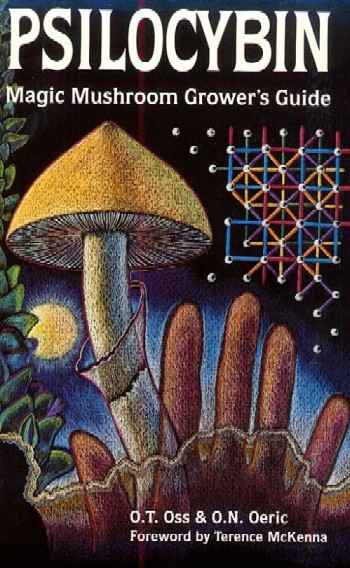 Refined sugar was a particular target of his ire. McKenna classified it as a drug, for its addictive qualities and negative health effects, then pointed out the effect of this worldwide addiction on human history. Numerous wars have been fought over sugar, and entire generations were condemned to slavery in the service of its cultivation, he noted, as opposed to the innocent mushroom which only ever wanted to make people happy.
Refined sugar was a particular target of his ire. McKenna classified it as a drug, for its addictive qualities and negative health effects, then pointed out the effect of this worldwide addiction on human history. Numerous wars have been fought over sugar, and entire generations were condemned to slavery in the service of its cultivation, he noted, as opposed to the innocent mushroom which only ever wanted to make people happy. 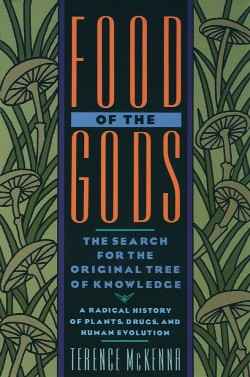 In an essay on the topic published in 2000, McKenna wrote: "We wouldn't be here if it weren't for psychedelic drugs. In terms of the role of psilocybin in human evolution on the grasslands of Africa, people not on drugs were behind the curve. The fact is that, in terms of human evolution, people not on psychedelics are not fully human. They've fallen to a lower state, where they're easily programmed, boundary defined, obsessed by sexual possessiveness which is transferred into fetishism and object obsession. We don't want too many citizens asking where the power and the money really goes. Informed by psychedelics, people might stop saluting. 'Take your political party, your job, whatever, and shove it.' "
In an essay on the topic published in 2000, McKenna wrote: "We wouldn't be here if it weren't for psychedelic drugs. In terms of the role of psilocybin in human evolution on the grasslands of Africa, people not on drugs were behind the curve. The fact is that, in terms of human evolution, people not on psychedelics are not fully human. They've fallen to a lower state, where they're easily programmed, boundary defined, obsessed by sexual possessiveness which is transferred into fetishism and object obsession. We don't want too many citizens asking where the power and the money really goes. Informed by psychedelics, people might stop saluting. 'Take your political party, your job, whatever, and shove it.' "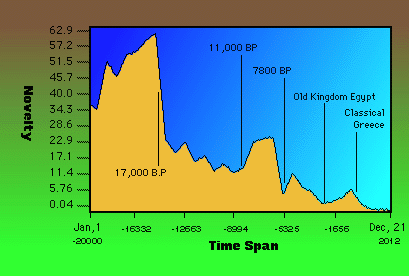 Time Wave Zero influenced a generation of doomsayers, and features somewhat prominently in
Time Wave Zero influenced a generation of doomsayers, and features somewhat prominently in